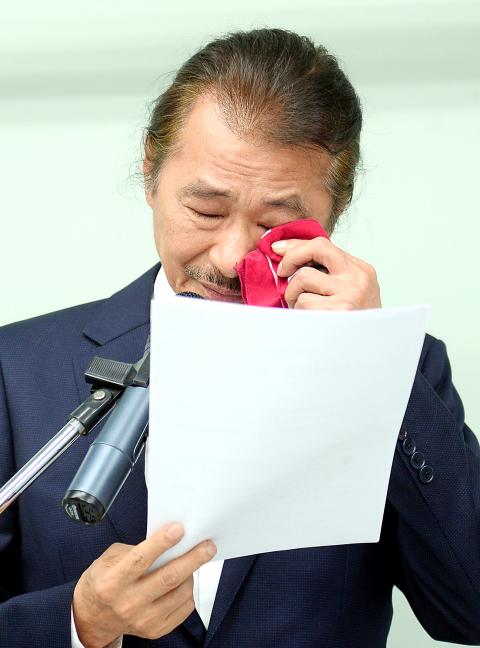Veteran activist Shih Ming-te (施明德) yesterday announced it would be impossible for him to reach the signature petition threshold necessary to be placed on the ballot as an independent presidential candidate, effectively ending his candidacy.
“After working hard for more than three months, I have to concede that there is no way I can get over the threshold through legitimate means,” Shih said. “I poured my heart and soul into achieving the 300,000-signature threshold. I apologize to everyone who was willing to provide me with copies of their national identification cards to support me — I have let you all down.”
The Central Election Commission requires that copies of national identification cards be provided for each signatory of a petition drive.

Photo: Lin Cheng-kung, Taipei Times
An emotional Shih choked up as he called on the remaining presidential hopefuls to “take into consideration” his campaign pledges to maintain the cross-strait “status quo,” move toward a Cabinet system of government and redistribute wealth, reiterating his belief that reconciliation between the pan-blue and pan-green political camps is the only way for the nation to move forward.
Shih said he wrote his announcement the previous night, with most staffers only learning of his decision yesterday morning.
“The Central Election Commission has many rules that are ‘over-the-top’ and prevent people who are younger, and lack money and party affiliation, from participating in public affairs,” he said, while refusing to comment on what specific reforms he would recommend.
Shih had previously said the presidential ballot signature threshold was unfair to independent candidates, criticizing rules that he said would force him to declare a running mate months before candidates from major parties.
Regulations would have required Shih to declare a running mate as part of the official registration process, which is to begin this week.
Throughout his remarks, he never used the word “withdraw” to describe his decision, saying in response to questions that he did not have the “standing” to “withdraw” because he had not officially registered.
“People would have nitpicked that the signatures I have already gathered are outside the scope of the law,” he said, when asked how far he was from reaching the signature petition threshold.
He said that only signatures collected within 45 days of official registration can legally count toward meeting the petition threshold.
Shih had previously been quoted by the media as saying that he had already collected more than 100,000 signatures.
He refused to comment on whether he would support another presidential candidate.

A preclearance service to facilitate entry for people traveling to select airports in Japan would be available from Thursday next week to Feb. 25 at Taiwan Taoyuan International Airport, Taoyuan International Airport Corp (TIAC) said on Tuesday. The service was first made available to Taiwanese travelers throughout the winter vacation of 2024 and during the Lunar New Year holiday. In addition to flights to the Japanese cities of Hakodate, Asahikawa, Akita, Sendai, Niigata, Okayama, Takamatsu, Kumamoto and Kagoshima, the service would be available to travelers to Kobe and Oita. The service can be accessed by passengers of 15 flight routes operated by

Chinese spouse and influencer Guan Guan’s (關關) residency permit has been revoked for repeatedly posting pro-China videos that threaten national security, the National Immigration Agency confirmed today. Guan Guan has said many controversial statements in her videos posted to Douyin (抖音), including “the red flag will soon be painted all over Taiwan” and “Taiwan is an inseparable part of China,” and expressing hope for expedited reunification. The agency last year received multiple reports alleging that Guan Guan had advocated for armed reunification. After verifying the reports, the agency last month issued a notice requiring her to appear and explain her actions. Guan

GIVE AND TAKE: Blood demand continues to rise each year, while fewer young donors are available due to the nation’s falling birthrate, a doctor said Blood donors can redeem points earned from donations to obtain limited edition Formosan black bear travel mugs, the Kaohsiung Blood Center said yesterday, as it announced a goal of stocking 20,000 units of blood prior to the Lunar New Year. The last month of the lunar year is National Blood Donation Month, when local centers seek to stockpile blood for use during the Lunar New Year holiday. The blood demand in southern Taiwan — including Tainan and Kaohsiung, as well as Chiayi, Pingtung, Penghu and Taitung counties — is about 2,000 units per day, the center said. The donation campaign aims to boost

The Central Weather Administration (CWA) said a magnitude 4.9 earthquake that struck off the coast of eastern Taiwan yesterday was an independent event and part of a stress-adjustment process. The earthquake occurred at 4:47pm, with its epicenter at sea about 45.4km south of Yilan County Hall at a depth of 5.9km, the CWA said. The quake's intensity, which gauges the actual effects of a temblor, was highest in several townships in Yilan and neighboring Hualien County, where it measured 4 on Taiwan's seven-tier intensity scale, the CWA said. Lin Po-yu (林柏佑), a division chief at the CWA's Seismological Center, told a news conference